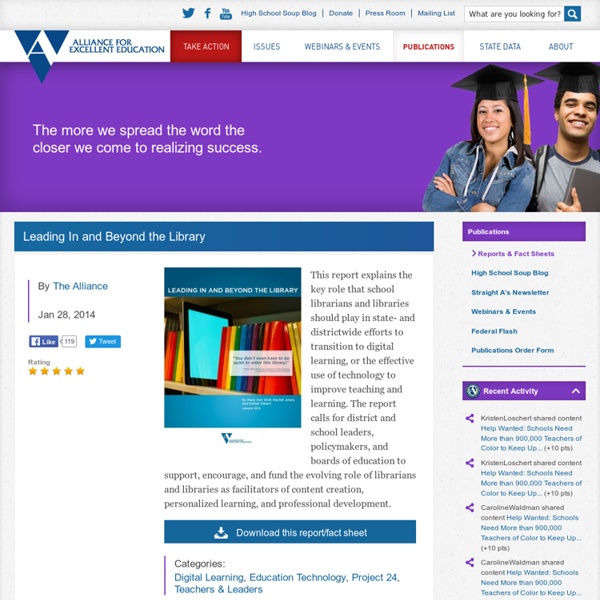



Personalizing the Learning Experience: New Insights from Future Ready Schools – Medium When done well, personalized learning has the potential to radically transform how we teach and learn and how we create more equitable opportunities for students. In the 2016 National Educational Technology Plan (NETP), our flagship policy document for educational technology, the U.S. Department Education defines personalized learning: Personalized learning refers to instruction in which the pace of learning and the instructional approach are optimized for the needs of each learner. Learning objectives, instructional approaches, and instructional content (and its sequencing) may all vary based on learner needs. On Monday, September 12, we are supporting the White House Next Generation High Schools Summit in bringing together six states and more than 20 school districts to commit to redesigning their high schools. In support of these events, we are releasing the first set of blogs from our personalized learning series, Personalizing the Learning Experience.
The Next Generation of (Personalized) Learning We all want our children to receive the best education possible. One of the key questions we’re interested in answering, as a foundation, is “what does high-quality instruction look like in U.S. schools?” And one way we’re looking at answering that question is by looking at the potential of what the foundation calls personalized learning for students. Did you know that less than half of the 2012 graduating class that took the ACT college entrance exam scored at the level that predicts earning a “C” or better in math as freshman in college? Sixty years is too long. For more than 150 years, the system has been organized around the idea that students of similar ages should move along together, through the same material, at roughly the same pace. We can all agree that students are individuals with different interests and learning needs. So, the question is: how do we provide instruction to our children that meet all students’ needs?
Future Ready Librarians - Future Ready Schools We are super excited that you are registering to join us at the Denver Future Ready School Institute. Complete the registration below to make it official! The Future Ready Librarians (FRL) strand of the Institute will provide opportunities to explore how librarians can support FRS via the FRL framework;learn how to develop teacher librarians as educational and instructional leaders;create conversations about the role of librarians supporting strategic work of schools; anddevelop networks and cross-functional teams to support and sustain FRL in districts. Since you are registering as a Future Ready Librarian, don’t forget to check to make sure your superintendent has taken the pledge and become familiar with the FRS Framework as well the FRL program.
Moving Towards Next Gen Learning *Reposted with permission from GettingSmart.com Raise your hand if you have uttered any of the following phrases in the past week: Blended learning Competency-based learning Personalized learning Digital learning Online learning Connected learning Deeper learning Project-based learning Student-centered learning Optimized learning Hybrid learning Next generation learning Now raise your hand if you can define them so that the neighbor you barbecued with last weekend could remember and articulate the distinctions. We are, let’s face it, a Tower of Babel when it comes to defining what we’re all doing here. We can make the accomplishment of positive change a few degrees easier, though, by continuously striving to introduce bits of clarity amidst the messiness. The graphic you see here builds (with Michael Horn’s and Heather Staker’s blessing) on the taxonomy of blended learning developed by the Christensen Institute. Who’s working to design and implement next gen learning?
National Education Technology Plan - Office of Educational Technology About the National Educational Technology Plan The U.S. Department of Education released the 2024 National Educational Technology Plan (NETP): A Call to Action for Closing the Digital Access, Design and Use Divides. First released in fulfillment of the 2000 Educate America Act, NETP has been updated multiple times since its original release, most recently in 2016. While past NETPs have largely served as surveys of the state of the field, the Department of Education’s 2024 NETP frames three key divides limiting the transformational potential of educational technology to support teaching and learning, including: The Digital Use Divide, addressing opportunities to improve how students use technology to enhance their learning, including dynamic applications of technology to explore, create, and engage in critical analysis of academic content and knowledge;
Updated Personalization vs. Differentiation vs. Individualization Chart Version 3 Personalization v Differentiation v Individualization (PDI) Chart (Version 3) The PDI chart was created for a reason: to clarify the differences in these terms. In 2010, the National Ed Tech Plan defined all three of these terms as they are related to instruction. We needed to emphasize the differences: Personalization is learner-centered. The other two, Differentiation and Individualization are teacher-centered. Personalization or Personalized Learning means the learner is driving their learning. It has been some time since we initially published the PDI Chart in January 2012. We updated the chart again to version 3 from your feedback. Individualization involves assessment OF learning.
School Libraries Transform Learning This digital magazine produced by AASL in partnership with American Libraries, is designed to be shared with parents, colleagues, administration, and policymakers. Available electronically or as a PDF download, this tool can open the door to discussions on the multiple ways school libraries transform learning. Articles "I'm an Expert" School Librarians Transform Learning Reimagining Advocacy for School Libraries "Do Kids Even Use the Library Anymore?" Creating Coalitions Building Advocacy before a Crisis Extras Give printed copies to your stakeholders during your conversations! School Library Advocacy Packs These advocacy packs are intended to be used as tools to spread the word about the many ways school librarians are transforming teaching and learning. This pack includes: 2015 | Item # 9200-2015 | Free.